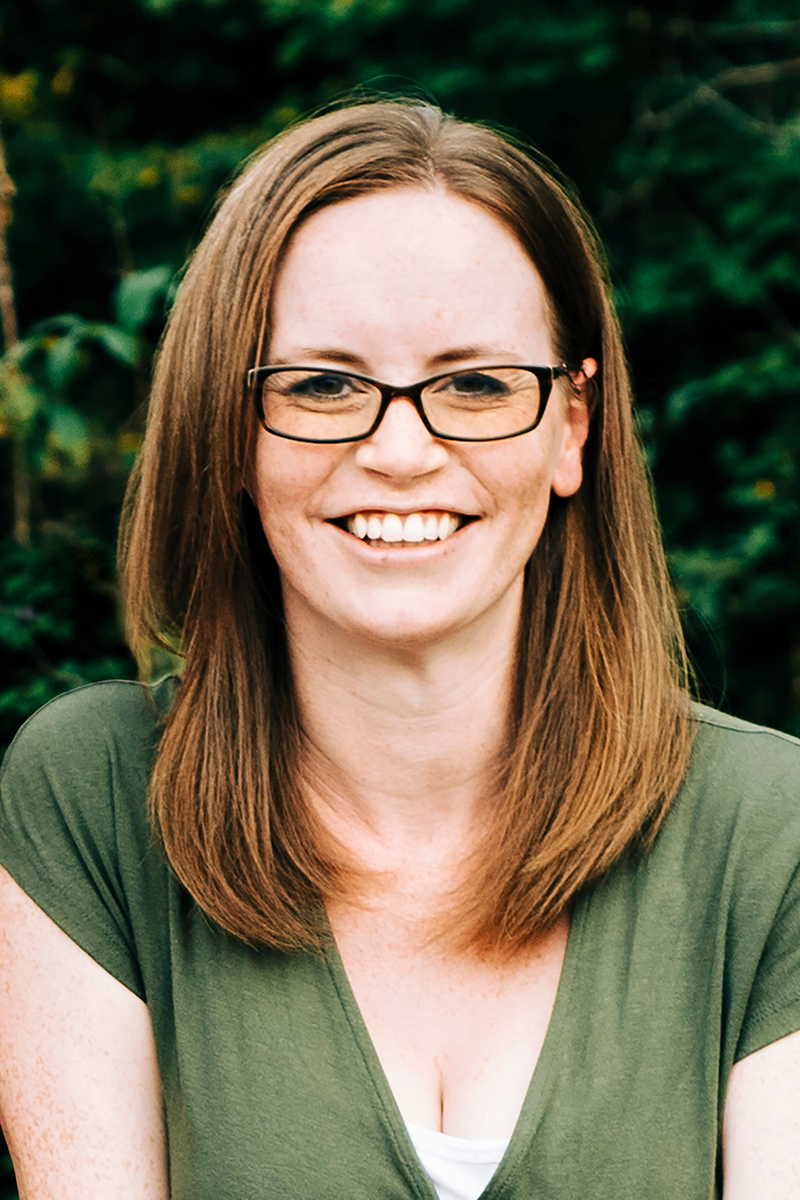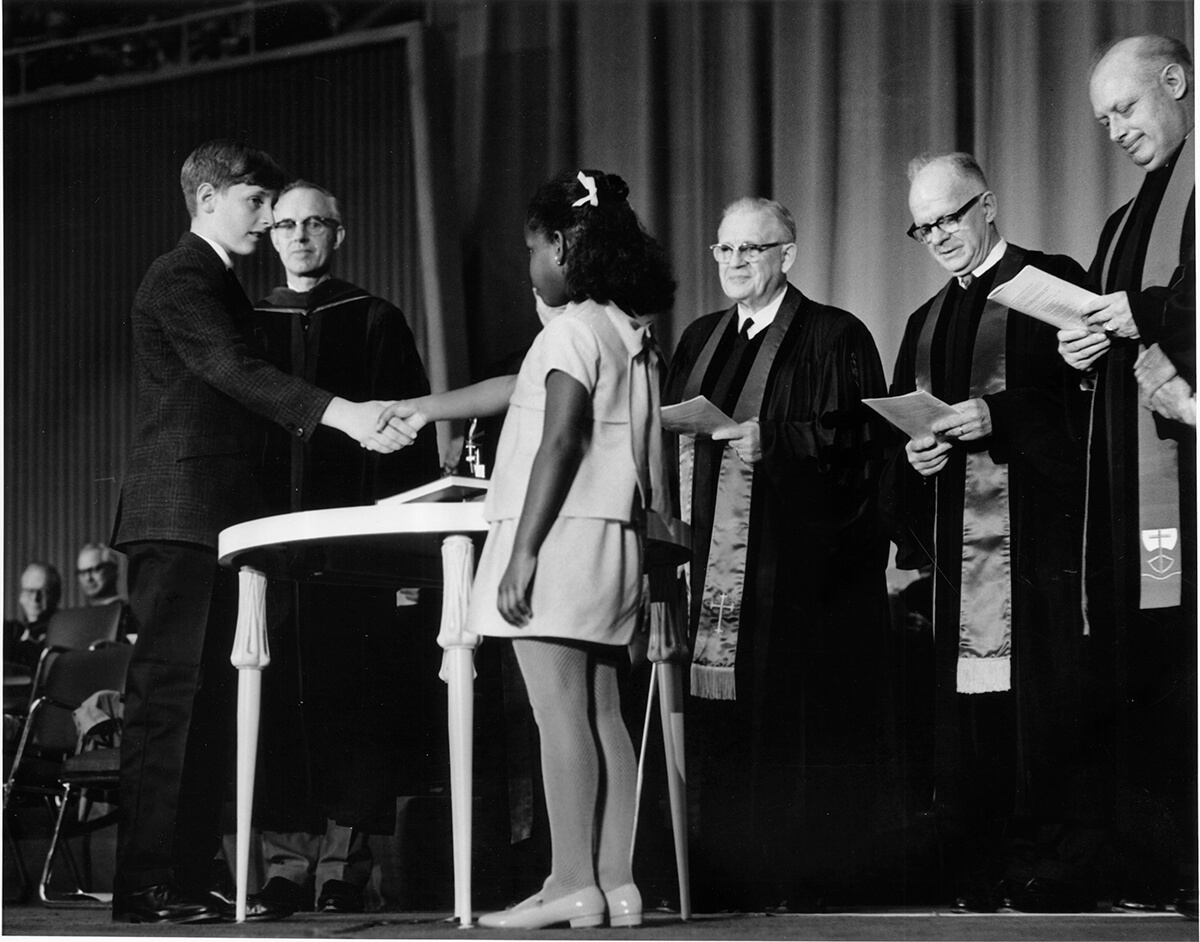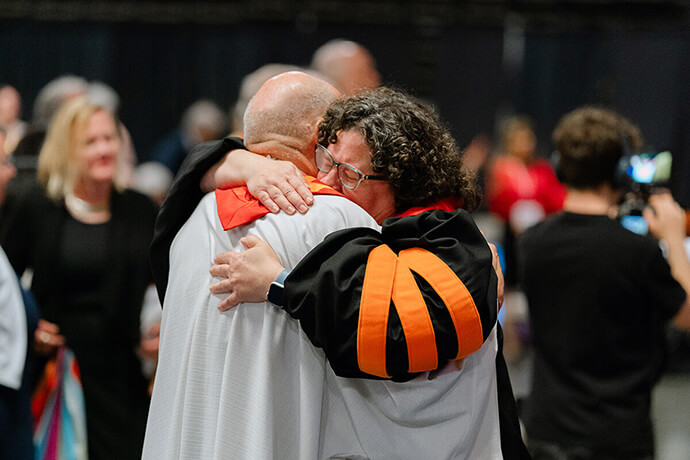Key points:
- In “Wesleyan Vile-tality: Reclaiming the Heart of Methodist Identity,” historian Ashley Boggan advocates for The United Methodist Church to be countercultural.
- The top executive of Archives and History touts being “vile,” which is generally not considered a positive attribute.
- Methodism founder John Wesley wrote that he submitted to being “more vile” by preaching in the field to all instead of only believers in churches.
Look up “vile” in a dictionary, and you’ll see synonyms like “evil,” “sinful,” “vicious” and “immoral.”
So why is a new book projecting a way forward for The United Methodist Church called “Wesleyan Vile-tality?”

Ashley Boggan, top executive of the United Methodist Commission on Archives and History and author of “Wesleyan Vile-tality: Reclaiming the Heart of Methodist Identity,” is happy to explain.
“Liking the word ‘vile’ has to be taken in the context that (John) Wesley was using it,” Boggan said in an interview with UM News. It was the founder of Methodism who first used the word in the context of evangelization.
“It is catchy when you tell a bunch of clergy or bishops or laity that they might want to be more vile,” Boggan said. “The way that Wesley used it when he preached in the fields for the first time in 1739, he says that he submits. He submitted to be ‘more vile.’
“Is God calling you to take the love of God to places where you might not really want to go —places or people who society says maybe don’t go there?” Boggan asked. “I think the word (vile) just stands out to me and really says that this was a call. This was not something that Wesley planned on doing.”
“Wesleyan Vile-tality” makes its case partially by critiquing times that Boggan believes Methodists have fallen short. Examples include the long waits for women, LGBTQ people and racial minorities to be considered as full equals in the denomination. For example:
- It took until 2019 for the church to add “men and women are of equal value in the eyes of God” into the denomination’s constitution.
- Only a year ago at the General Conference held in Charlotte, North Carolina, did United Methodists lift long-standing bans on the ordination of LGBTQ clergy and the hosting of same-sex weddings by clergy and churches. About a quarter of U.S. United Methodist churches left the denomination in recent years over disagreements about how inclusive to be of LGTBQ people in the life of the church.
- Despite Wesley’s strong stand against slavery dating back to 1774, predecessor denominations of The United Methodist Church wavered on the issue, leading many Black Methodists to leave and form new denominations, such as the African Methodist Episcopal Church founded in 1816.
- Methodists were among the denominations that ran boarding schools for Native American children, where the children were stripped of their culture and otherwise mistreated in the name of integrating them within white society.
Supporting inclusion and other social justice issues often leads to “progressive” labels. Some in the denomination argue that the church has become too involved in politics.
“The (United Methodist) church in the U.S. has adopted ideological positions that are often outright partisan,” wrote Cliff White, an attorney and longtime United Methodist in a commentary published April 23 by UM News. “By using the good name and resources of The United Methodist Church to advance an ideological agenda, the authority of the church is diminished and we become little different from any other civic, even partisan, organization.”

Still, United Methodist leaders and agencies stress what they are doing is not partisan but advocating for the denomination’s Social Principles. The social teachings are intended to represent “the prayerful and earnest efforts of the General Conference to speak to the issues in the contemporary world from a sound biblical and theological foundation that is in keeping with the best of our United Methodist tradition.”
On May 7, the Council of Bishops issued four letters, including calls for the rejection of violence against transgender persons and to take a stand against the dismantling of diversity, equity and inclusion policies. The United Methodist Board of Church and Society released similar social justice position statements on May 20 that are based on the Social Principles.
Subscribe to our
e-newsletter
Boggan is happy the church is headed in that direction.
“If we’re going to actually ground ourselves in Wesley, it’s really hard to not be progressive socially,” she said. “Methodism, particularly in the U.S., has allowed us to stray from the radicalness that Wesley was calling us to be.”
The biblical imperatives are clear, she said.
“Put everything that you have as a privileged person on the line to make sure that those who are outside of that privilege can know their own worth and the love of God,” Boggan said. “I’m sure this is alienating, but it’s really hard for me to understand how a person can really, truly understand the Methodist identity and not seek to ensure progressive values in all of society.”
Methodism lost this focus when it became so popular that it had more to lose if it alienated some of its members, she said. She said the denomination became “too institutional.”
The United Methodist Church had a high of 12.5 million members in 2018, according to reporting by the denomination’s General Council on Finance and Administration. At the end of 2023, post COVID and disaffiliations, it’s closer to 10 million, the finance agency reports.
“I think within the history of Methodism, the desire for respectability lined up with the desire for power,” Boggan said. “That aligns with becoming an institution, when you have reached a certain size and you’ve shown that that you can follow the rules and still kind of challenge society a little bit, but in ways that aren’t threatening.”
That is “where we lost sight of our Wesleyan roots,” Boggan said.

“I see a lot of hope in us going back to who Wesley wanted the people called Methodist to be, and for me that is folks who (value) the equity of all persons, no matter their gender identity, sexual orientation, race, ethnicity, economic status, social status, immigration status or citizenship.”
That moral stance is what Methodists need to reclaim, she said.
“That is the thing that we’ve lost sight of, and to reclaim that in an actual, practical way, means being willing to push social and potentially legal boundaries that prevent that from happening, not only in the U.S. but around the world.
“The hard thing is that’ll have consequences,” she said. “If you look at John Wesley and those early Methodists, they were seen as a really socially and religiously disruptive group. They were tarred and feathered and subject to mobs and subjected to jail.”
As hard as consequences might be, it is still a “necessary” thing for Methodists to do, she believes.
“If we’re really going to say that women and trans folks and queer folks and persons who aren’t U.S. citizens, but are here working, deserve the right to be here and to be where God is calling them, that might require those of us who are in a privileged space putting ourselves out there.”
The new vision statement for the church released May 1 is a step in the right direction, Boggan said. The statement is: “The United Methodist Church forms disciples of Jesus Christ who, empowered by the Holy Spirit, love boldly, serve joyfully and lead courageously in local communities and worldwide connections.”
“If you’re going to transform the world through loving boldly, serving joyfully and leading courageously, then that necessitates some sort of countercultural aspect, especially today,” she said.
“I almost wish it didn’t,” Boggan said. “It would be easier if it didn’t, but that’s not the world we live in.”
Patterson is a UM News reporter in Nashville, Tennessee. Contact him at 615-742-5470 or newsdesk@umnews.org. To read more United Methodist news, subscribe to the free Daily or Weekly Digests.




